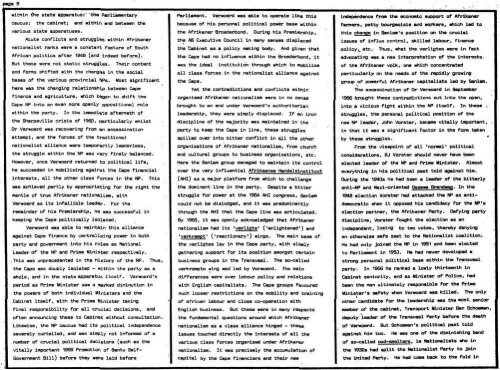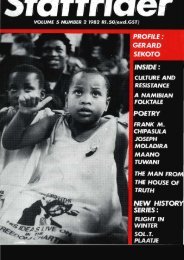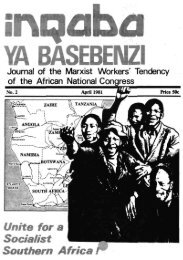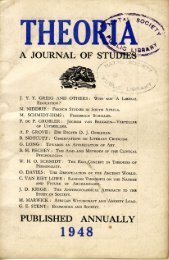Create successful ePaper yourself
Turn your PDF publications into a flip-book with our unique Google optimized e-Paper software.
within t>e st«t« apparatus: the Parliamentary<br />
caucus; the cabinet; and within and between the<br />
various state apparatuses.<br />
Acute conflicts and struggle* within Afrikaner<br />
nationalist ranks were a constant feature of South<br />
African politics after 1W8 (and indeed before).<br />
But these were not static struggles. Their content<br />
and forms shifted with the changes in the social<br />
bases of the various provincial NPs* most significant<br />
here was the changing relationship between Caps<br />
finance and agriculture, which began to shift the<br />
Cepe NP into an even more openly oppositional role<br />
within the party. In the immediate aftermath of<br />
the Sherpevllle crlets of I960, particularly whilst<br />
Dr Verwoerd was recovering from %n assassination<br />
attempt, end the forces of the traditional<br />
nationalist alliance were temporarily leederless,<br />
the struggle within the NP was very finely balanced.<br />
However, once Verwoerd returned to political life,<br />
he succeeded in mobilising against the Cepe financial<br />
intereats, all the other elaes forces in the NP. This<br />
wes echieved pertly by epproprieting for the right the<br />
mantle of true Afrikaner nationalism, with<br />
Verwoerd es Its lnfellible leader. For the<br />
remainder of hie Premiership, he M 9<br />
keeping the Cape politically iaolated.<br />
successful in<br />
Verwoerd was able to maintain this alliance<br />
against Cape finance by centrelleing power in both<br />
party and government into hie rolee as National<br />
Leader or the NP and Prime Minister respectively.<br />
.This was unprecedented in the hiatory of the NP. Thus,<br />
the Cape was doubly Isolated - within the party as a<br />
whole, and in the state apparatus Itself. Verwoert's<br />
period as Prime Minister saw a narked diminution in<br />
the powers of both individual Ministers and the<br />
Cabinet itself, with the Prime Minister taking<br />
final responsibility for all crucial decisions, and<br />
often announcing these to Cabinet without coneultation.<br />
Likewise, the NP caucua had its political independence<br />
severely curtailed, and was simply not informed of a<br />
number of crucial political decisions (such as the<br />
vitally important 1959 Promotion of Bantu Self-<br />
Government Bill) before they were laid before<br />
Perliement. Verwoerd was able to operate Ilka this<br />
because of his personal political power base within<br />
the Afrikaner Browdertond. During his Premiership,<br />
the AS Executive Council in many senses displaced<br />
•<br />
the Cabinet as a policy making body. And given thet<br />
the Cepe had no influence within the Broederbond, it<br />
was the ldeel institution through which to mobilise<br />
all class forcea in the nationalist alliance egalnst<br />
the Cepe*<br />
Yet the contradictions and conflicta within<br />
organised Afrikaner netionaliea were in no senee<br />
brought to en end under Verwoerd's authoriterlan<br />
leadership, they were aimply displaced. If an iron<br />
discipline of the mejority eas mainteined in the<br />
party to keep the Cape in line, these struggles<br />
spilled over into bitter conflict in ail the other<br />
orgenisetions of Afrikaner netlonelism, from church<br />
and cultural groups to buslneas organisations, etc.<br />
Here the Sanlam group managed to maintain its control<br />
over the very influential Afrlkaanse Handel sins tltuut<br />
(AHI) ae a major pletfora from which to challanga<br />
the dominant line In the party. Despite e bitter<br />
struggle for power et the 196fl AHI congress, Sanlam<br />
could not be dislodged, and it was predominantly<br />
through the AHI that the Cape line was articulated.<br />
8y 1965, it was openly acknowledged thet Afrikaner<br />
nationalism had Its 'verllote' ('enlightened*) and<br />
'verkrempt* (•reactionary*) wings. The main base of<br />
the verllgtea ley in the Cape party, with elenly<br />
gathering support for ite position amongst certain<br />
business groups In the Transvaal. The so-called<br />
verkrempte wing was' led by Verwoerd. The main<br />
differencee ware over labour policy and relations<br />
with English capitalists* The Cape groups favoured<br />
much looser restrictions on the mobility and training<br />
of afrlcan labour and close co-operation with<br />
English buslneae. But these were in many respects<br />
the fundamental questions around which Afrikaner<br />
netlonelism es a claaa alliance hinged - these<br />
issues touched directly the Intereats of all the<br />
verious class forces organised under Afrikaner<br />
nationalism), tt eae precisely the accumulation of<br />
capital by the Cepe financiers and their new<br />
independence from the economic support of Afrikaner<br />
fanners, petty bourgeoleie and sorters, which led to<br />
this change in Sanlam's position on the crucial<br />
issues of influx control, skilled labour, finance<br />
policy, etc. Thus, what the verllgtea eere in feet<br />
advocating wes e new Interpretation of the interests,<br />
of the Afrikaner volk, one which concentrated<br />
particularly on the needs of the rapidly growing<br />
group of powerful Afrikaner capitalist* led by Swnlem.<br />
The assassination of Or Verwoen) in September<br />
1966 brought these contredictlons out into the open,<br />
Into a vicioua fight within the NP itself. In these ^<br />
atrugglea, the personal political poaition of the<br />
new NP leader, John Voreter, became vitally Important,<br />
in that it was a significant factor in the form taken<br />
by these struggles.<br />
From the viewpoint of all 'normal* political<br />
considerations. 8J Voreter should never have been<br />
elected leeder of the NP and Prime Minister. Almost<br />
everything in hie political past told against him.<br />
During the 19eOs he had b—n e leader of the bitterly<br />
enti-NP and Nexl-orlented Oasewa Branding. In the<br />
1948 election Voreter had attacked the NP aa anti<br />
democratic whan It opposed his candidacy for the W»*s<br />
election partner, the Afrikaner Party. Defying perty<br />
discipline, Voreter fought tne election ae en<br />
independent, ioeing by two votee, thereby denying<br />
en otherwise eefe eeat to the Natlonmliet coalition.<br />
He hed only Joined the NP in 1951 and been elected<br />
to Parliament in 1933. He hed nm^r developed a<br />
strong personal political beam within the Tranavaal<br />
perty. In 1966 he ranked a lowly thirteenth in<br />
Cabinet seniority, end as Minister of Police, had<br />
been the man ultimately responsible for ttie Prime<br />
Minister's safety when Verwoerd waa killed. The only<br />
other candidate for the leadership eea the moat eenior<br />
member of the cabinet. Transport Minister Ben ScJvjemmn,<br />
deputy leader of the Treneveal Party before the death<br />
of Verwoerd. But Bchoaman's political paet told<br />
against him too. He waa one of the diminishing band<br />
of so-called oud-ameIters, le Natlonmliata who in<br />
the 19Xe had split the Nationalist Party to join<br />
the United Party. He hed come back to the fold In

















